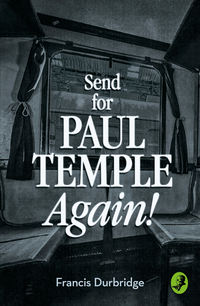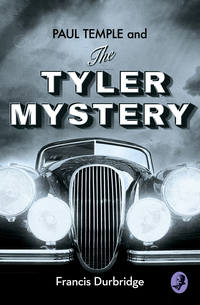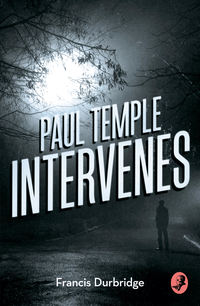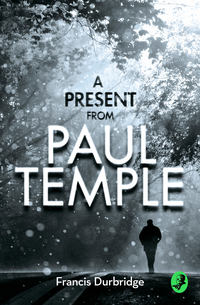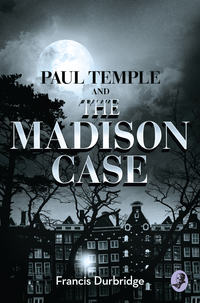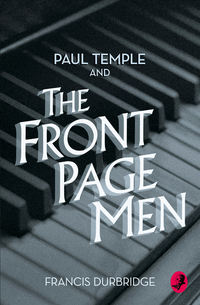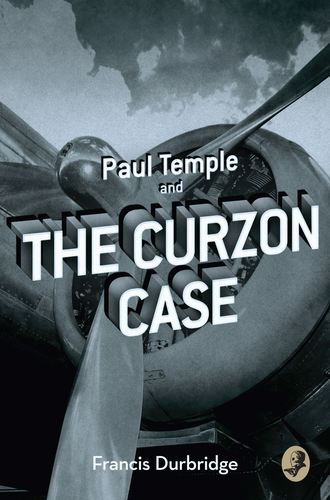
Полная версия
Paul Temple and the Curzon Case
Paul bought the drinks while Steve took care of the small talk. He watched the girl in the mirror behind the bar. A striking figure, elegantly dressed, but for a niece of Lord Westerby surprisingly lacking in poise. She fiddled with her long blonde hair as she talked and kept glancing about the room.
‘Did anyone follow you here?’ she asked when Paul arrived with the drinks. ‘Did you notice a large red saloon car?’
‘Don’t worry,’ said Paul. ‘Parking is so bad in London now that gangsters travel by taxi.’
The girl tried to smile. ‘I’m sorry, Mr Temple. I’m not used to physical danger. Six weeks ago I was leading a perfectly ordinary life. That’s why I’m frightened. They’ve already tried to kill me twice, and sooner or later they’ll succeed.’
‘Now listen,’ said Paul with a laugh, ‘I know that two boys have vanished into thin air, but—’
‘You don’t know much about Curzon, do you?’
‘That’s true,’ Paul agreed. ‘That’s why I’m here, remember? You telephoned me and said you’d been talking to Charlie Vosper. We quoted Byron at each other.’ He broke off. Two men had come into the bar with that purposeful look of debt collectors in search of a defaulter. ‘So tell me about Curzon, Miss Maxwell.’
‘Of course,’ she said quickly. ‘It was good of you to come.’ The two men moved together into the centre of the room. ‘Five weeks ago when I was staying at Westerby Hall I came across—’ The larger of the two men took a pistol from his raincoat pocket and fired it from point-blank range. The girl stared in dismay before spinning backwards off her chair. A sudden cavity appeared in the side of her neck and filled with blood.
‘Get down, Steve, for God’s sake!’ Paul shouted.
The two men ran before the panic started. They were gone when Paul Temple reached the street. He caught a glimpse of a red saloon car driving away. People were screaming in the bar, several men spilled into the street, and when Paul returned he found a crowd staring down at the girl—
Steve was kneeling beside the girl’s head, dabbing ineffectually at the wound with a Kleenex. She looked up at Paul. ‘Diana Maxwell is dead,’ she murmured.
Paul picked up a broken sherry glass from the carpet. A pool of blood had been seeping towards it. ‘If this poor kid is dead,’ he said in bewilderment, ‘somebody has blundered. Because she is not Diana Maxwell.’
Chapter Two
Dulworth Bay had been a fishing village since Saxon times, and according to local legend it had then been a popular landing place for marauding Danes. The older families were still predominantly blonde-haired, and the growth of modern Britain had made little impact on their culture. The village was built precariously round the bay, ramshackle houses poised on the cliffs and steep winding streets plunging down to the beach.
A sprinkling of artists had moved into the village, and a few weekend people from Leeds and Middlesbrough had bought weekend houses, but they didn’t belong. In Dulworth Bay you remained a foreigner for three generations, and holidaymakers were encouraged to keep moving until they reached Scarborough twenty miles to the south. To the west, a few hundred yards inland, the Whitby moors extended into nothing.
It was a remote spot, yet the police grapevine covered it effectively. A brief telephone call from Inspector Vosper to his north-country colleague ensured that Paul Temple’s visit to Yorkshire was doomed to frustration.
‘But this visit is nothing to do with your Baxter brothers,’ Steve had protested innocently. ‘This is a purely nostalgic holiday. I used to know Whitby years ago.’
‘I don’t,’ the inspector had said doggedly, ‘want you involved.’
Paul Temple had been slightly exasperated. ‘When a girl asks for my help and is then killed sitting beside me, Charlie, I think I become involved. Whether you and I like it or not. I promised I’d help Miss Maxwell, because she was afraid—’
‘Miss Maxwell is alive and well and staying in Yorkshire!’ said Vosper. When they were out of earshot he telephoned Inspector Morgan. The mention of Assistant Commissioner Forbes had clinched it: they would treat Paul Temple and his wife with impeccable good manners and absolute inscrutability.
They were staying at the Victoria Hotel in Whitby, as a gesture towards diplomacy. It would look less, Paul had thought, as though they were investigating the Dulworth Bay mystery. But Inspector Morgan paid them a courtesy visit on the first morning after their arrival. ‘Just to see whether I can be of help,’ he said diplomatically. ‘Mrs Temple may have forgotten her way around after all those years in the south…’ Inspector Morgan was stationed in Whitby, which he clearly thought would be convenient for them all. ‘Where were you thinking of visiting?’
Steve mentioned St Gilbert’s, ‘Although I think I can find it without having to trouble you, Inspector.’
‘St Gilbert’s?’ he repeated inscrutably. ‘I don’t suppose you’re telling me that Mrs Temple wants to visit her old school?’ He seemed about to wink at Paul. ‘Because St Gilbert’s is a boys’ school.’ He stared smugly at Steve’s trim figure.
‘One of the masters is an old friend of my uncle’s,’ she explained. ‘I haven’t seen him since I was fourteen. He was the Latin master in those days, which is probably why I still find amo-amas-amat slightly romantic. I’ve invited him to dinner this evening.’
‘Sounds as though it should be fun,’ said the inspector. ‘Have you planned many other trips down memory lane?’
‘Westerby Hall?’ Paul suggested.
‘Westerby Hall,’ the inspector repeated with impeccable good manners. ‘Ah yes, that’s where Lord Westerby lives.’
‘Quite.’
‘I don’t,’ he said cannily, ‘know whether Miss Maxwell is staying with him at the moment.’
‘Never mind,’ said Paul. ‘If she isn’t there I’m sure the walk will have done us good. Our journey won’t be wasted. There’s nothing like the Yorkshire moors—’
‘I did hear a rumour that Miss Maxwell is dead.’
‘False, Inspector Morgan, as you well know!’
Paul Temple had tried to find Miss Maxwell in London, but she had proved elusive. The flat which she shared with a girl called Bobbie Jameson had been empty when he called. Miss Jameson was dead and Miss Maxwell had left for Yorkshire. Paul had let himself in the front door with a sliver of perspex against the lock, and he had spent nearly half an hour searching for something to indicate what the girls were mixed up with. But he found nothing.
It was obvious that Diana Maxwell used the flat merely as a pied-a-terre when she was in London. There were few possessions or papers belonging to her, and most of the photographs were of Bobbie Jameson. She had been the girl in the pub.
The instinct for self-preservation which had prompted Diana Maxwell to send a substitute had also led her straight back to Yorkshire when death had struck. But three hundred miles, Paul reflected sourly, was not very far if someone was determined to kill you.
Despite his boast to Inspector Morgan Paul drove out to Westerby Hall. He saw no reason to overdo the healthy life. The Yorkshire countryside was spectacular, but better appreciated from behind the wheel of a car. By foot it could reduce a man to exhaustion and madness. It made a man feel small. Westerby Hall was a mile inland from Dulworth Bay, nestling in a valley as if in hiding.
‘Let’s walk up to the house, darling,’ Steve suggested as a compromise to physical fitness. ‘We can look at these incredible wrought iron gates. I do believe they’re by Tijou.’
They parked by the monumental gates. Steve examined them ecstatically, talking of Tijou’s work at Hampton Court and speculating on the likelihood of the master travelling so far north.
There was a stream running along the high brown stone wall of the estate, and Paul’s eyes followed the glittering band of water through the valley. He could hear a noise like angry wasps approaching, and then in the distance he noticed a tiny green sports car driving much too fast down the hill from the moors. Its wheels visibly left the road as it leaped across a hump backed bridge and the noise of the engine became a roar.
‘Woman driver,’ said Paul.
Steve had decided the gates were superb imitations. She turned away reluctantly to watch the sports car. ‘She looks like a woman after your own heart,’ said Steve ironically. ‘Do you think someone’s chasing her?’
‘I wouldn’t be at all surprised,’ Paul said with a laugh.
She was doing at least seventy miles an hour along the narrow lane towards them. A girl’s blonde hair streamed out behind her, reminding Paul of advertisements for motor oil. The aggressive thrust of the engine seemed to pause and the noise rose an octave as the girl changed gear.
‘She’s trying to stop,’ Paul muttered.
‘Brakes?’ suggested Steve.
The car slithered suddenly, shuddered on to the grass verge, and without reducing speed travelled straight at Paul and Steve. It was almost entirely out of control, yet somehow the girl at the wheel managed to avoid them and smash into the wrought iron gates. The car came to rest several yards into the grounds with a tangle of irreplaceable metal twisted round the bonnet.
‘Damn!’ said the blonde.
She leapt miraculously from the wreckage and waved to Paul. ‘Sorry if I startled you,’ she called. ‘The bloody brakes failed.’ Her head disappeared beneath the front wheels while she tried to trace the mechanical fault.
‘Those beautiful gates,’ Steve said softly. ‘Look at the mess. And she hit them on purpose, to avoid the wall.’
‘And to avoid us,’ said Paul as he ambled across to the car. ‘I’m rather glad she doesn’t know much about art.’ He stared down at the girl’s lime-green slacks.
She wriggled out from under the wheels as he watched. ‘There you are,’ she said irritably, ‘the track rods have snapped in two.’
Paul gestured sadly at the buckled bonnet. ‘I’m afraid that’s a minor detail now, Miss Maxwell. You need a new engine, and the chassis looks none too healthy.’ But he glanced under the wheels to see the offending brakes. ‘Dangerous,’ he murmured.
‘I’ll get my uncle to send the chauffeur down. He can at least have it towed away.’ She stood up and turned to look at Paul with her full attention. An impressive girl with pale blue eyes, much more commanding and poised than the girl in the cafe. ‘How do you know my name?’ she asked.
‘We’ve spoken to each other on the telephone,’ said Paul. ‘I recognise your voice. You rang me in London. My name’s Temple, and the lady trying to mend the gates is my wife Steve.’
‘Hello,’ Steve called.
The girl was surprised. ‘I’ve no idea what you mean,’ she began. ‘I don’t know—’
‘You asked me to meet you in the Three Boars,’ said Paul. ‘But it was very wise of you not to come. You might have been killed.’ He smiled sympathetically. ‘By the way, I’m terribly sorry about your friend Bobbie Jameson. She was a nice girl. Her death must have been a great shock to you.’
Her pale blue eyes were coldly deliberate. ‘I didn’t ask you to meet me, Mr Temple. I’ve never spoken to you on the telephone and I wish you hadn’t told the police I had. It caused me some embarrassment.’
Paul shrugged and held open the door of his car. ‘I’m sure my friend Inspector Vosper was the soul of tact. Can I give you a lift to the Hall? It’s a long walk up this drive.’
She climbed into Paul’s car without a word. Wilful, Paul decided, temperamental, like a well-bred race horse. He waited until Steve was safely in the car beside him and then drove off.
‘It’s my belief,’ Paul resumed a few moments later, ‘that you did speak to me on the telephone, Miss Maxwell, that you made the appointment and then changed your mind at the last minute. I suspect you gave poor Miss Jameson a pretty accurate briefing, and that her story about three attempts having been made to kill you was true.’
She tossed her head so that the long blonde hair bounced angrily on her shoulders. ‘If I’d taken the trouble to make an appointment I should have kept it.’
The house was seventeenth century with early Victorian embellishments. It was much larger than it had appeared in the perspective of the valley. Paul drew up by the huge oak doors of the entrance. Almost immediately a young man came round the side of the house.
‘Hello,’ said the young man. ‘Something wrong?’
‘Yes,’ said Diana Maxwell. ‘I’ve smashed up the Aston Martin. Ran into those bloody gates. And to make matters worse this is Paul Temple and his wife.’
‘Oh dear, the man who set the police on to you.’ He turned with an amused expression to Paul. ‘We heard you were up in Yorkshire, Mr Temple. I suppose you’ve come to apologise to Diana?’
‘Not quite,’ said Paul. ‘I was really hoping for an explanation.’
‘Diana never explains anything,’ said the young man. ‘She’s much too aristocratic. Have you found the Baxter kids yet?’
His name was Peter Malo and his official role was secretary to Lord Westerby. But he behaved with proprietorial ease, helping Diana from the car and listening to her account of the crash at the entrance to the estate with humorous detachment.
‘Never mind, you’re alive and the car was insured,’ he said as he led her away. ‘And I’ve always thought those wrought iron monstrosities should be removed.’ He turned back, as if he had suddenly remembered Paul’s existence. ‘By the way, Temple,’ he called, ‘Lord Westerby wondered whether you could have dinner the day after tomorrow? Half past eight?’
‘We’ll be delighted,’ said Paul.
‘Perhaps you’ll have found the Baxter kids by then. Lord Westerby is worried about them, you know. Terribly worried.’
‘Why?’
The young man was taken aback. ‘Well, he is the squire, you know, he takes a benevolent interest in the community. Noblesse oblige.’ He waved carelessly and led Diana Maxwell away round the side of the house. ‘See you both the day after tomorrow.’
Paul Temple let in the clutch and drove away. It had been a frustrating afternoon so far. He wouldn’t learn much from Diana Maxwell or the supercilious young man unless they chose that he should.
‘What did you make of Miss Maxwell?’ he asked Steve.
Steve looked at the wreckage of the sports car as they drove past the gates. ‘A reckless driver,’ she murmured.
‘Not as reckless as all that,’ said Paul. ‘Her brake rods had been sawn nearly through with a hacksaw. They were bound to snap when she needed them most. Somebody tried to kill her, and I think she knew it.’
Paul drove in silence, up on to the moors and across the deserted wastes of green and purple heather. There was a strong breeze whistling over the undulating slopes which added to the sense of desolation. Sheep grazed unconcernedly at the roadside and far to the south the globes of the four minute warning system glinted in the sun.
‘Are we going somewhere?’ asked Steve.
‘I thought we might have tea in Goathland. Do you remember the first time I came up here, just after we met?’
‘Sentimental,’ murmured Steve.
They had a pot of tea for two and toasted scones in the most remote spot in England. Years ago they had discussed whether the village was named after the goats who inhabited the moors or the Goths who might have found it congenial for battles. There was a church, a post office stores, and a few houses straggled along the roadside. It had seemed an idyllic retreat in those days, when walking twenty miles had been pleasurable and sleeping in a tent had been a sensuous treat.
‘I think I’ll have one of those cream pastries,’ Steve said unromantically. ‘And then we’d better hurry. Don’t want to be late for our Latin school master. He’s a devil for punctuality, and he’ll have to get the boy back to the school before lights out.’
The schoolmaster was vague and affable; he talked about Steve’s uncle with the uncertainty of a man who usually finds he is discussing the wrong boy with the wrong parents. His name was Elkington and he arrived early with a sixteen-year-old youth in a blue school cap.
‘Consul victor em laudat,’ Paul said affably.
‘Very well, thank you,’ said the Latin master. ‘Have you met John Draper? He’s the boy you asked—’
‘Militibus turpe est captivos male custodivisse.’
Steve had to take Paul aside and explain that Mr Elkington was in fact English. ‘He used to double up as the sports master. He scored a century the last time I saw him play.’ So Paul discussed cricket with them over dinner, in English, which made conversation easier. It was one of the subjects which John Draper could discuss with authority.
The meal was English, with steaks and roast potatoes and garden peas, followed by apple pie. It was the only sort of meal to have in a northern hotel, Paul had felt, and he was enjoying the evening until the fair-haired youth exploded the pretence at polite conversation.
‘Isn’t it time you asked me the questions, Mr Temple?’ he asked suddenly. ‘I have to be back at school in two hours.’
‘Really, Draper!’ the Latin master protested. ‘This is a purely social—’
‘I’ve already told the police all I know about the Baxter brothers, so I’m afraid I shan’t be much help.
Paul grinned. ‘You’re quite right, John, I did ask Mr Elkington to bring you so that we could discuss the Baxter brothers. Why did you agree to come, I wonder?’
‘I wanted to meet you, Mr Temple. I read some of your books when I was in the sanatorium and I thought they were rather good.’ The slightly secretive smile was still hovering about the boy’s mouth. ‘And that police inspector said that on no account should I tell you anything, so I was thrilled to bits when the Elk said he was bringing me along. Er— I mean Mr Elkington.’
Mr Elkington coughed awkwardly. ‘The boys call me the Elk,’ he explained.
‘I’m anti the police,’ said the boy. ‘I’m going to university next year.’
‘The police appear to be anti me at the moment,’ said Paul with a laugh. ‘So suppose you tell me what you told the police? You went home with the Baxter brothers on the afternoon they disappeared, didn’t you? It is possible that some apparently insignificant detail will prove to be important later. What happened when Roger went in search of his brother?’
The allegiances had been established, and the boy assumed a confidential manner. ‘I went home. I popped into the Baxter cottage to tell their father I couldn’t wait, and then I went home.’
‘Did you walk home?’
‘Yes, sir.’
‘How far away do you live?’
‘About a mile and a half. It’s straight down the lane.’
‘Did you see anyone in the lane?’
‘No, sir.’
‘Did you hear anything?’
The boy’s self-confidence faltered. ‘No,’ he said after a pause. ‘I don’t think so. What sort of thing do you mean?’
He looked nervously at the Elk. ‘Do you mean anything suspicious?’
‘Anything at all,’ murmured Paul.
‘I don’t think I heard anything.’
Paul waited for the boy to make up his mind while Steve set the port in circulation.
‘Well, there was one thing. I don’t suppose it’s important, but when I left the Baxter cottage I thought I heard someone whistling.’
‘Good,’ Paul said promptingly.
‘But I couldn’t see anyone.’
‘Never mind, John; you thought you heard someone. What did the whistling sound like?’
‘I don’t really know.’ He laughed uncertainly. ‘It was pretty tuneless, as if he was thinking about something else.’
‘Not a wolf whistle, to attract attention?’ Steve intervened.
‘Good lord, no.’
‘Pop or jazz?’ Paul asked.
‘Neither.’
‘Ah,’ said Paul quickly, ‘so you did recognise the tune.’
The boy was confused. ‘I didn’t recognise it, Mr Temple.’
‘But you’re certain it wasn’t a call or a pop song or a jazz theme. So you either recognised the tune itself or you thought you recognised the person who was whistling it.’
The boy shrugged unhappily. ‘I’m not really sure,’ he muttered, ‘but I think it was Loch Lomond.’
‘And whom did you think was whistling it?’
‘I don’t know.’
That was all Paul could elicit from Master John Draper. It almost seemed like a wasted evening. Paul didn’t return to the subject until the Elk and his charge were leaving for the last train to Dulworth Bay.
‘Tell me, John,’ he said on the hotel steps, ‘have you ever heard of anyone called Curzon?’
‘No,’ said the boy, ‘I’m certain I haven’t.’
‘Never mind. It was kind of you to come. I’ve enjoyed meeting you. Civic civicismus, Mr Elkington.’
‘Such a pleasure to discuss old times—’
The fishing fleet was coming into Whitby harbour. Paul and Steve walked along the jetty and watched the boats tying up amid the flurry of excited seagulls and the busy preparations for unloading the catch. It was a cool, dry evening and the light from either the moon or the harbour electricity was sharply clear.
‘Impressive,’ said Paul. ‘I envy you a childhood spent among fishing fleets and countryside like this.’ It was a comment which Paul made whenever he ventured north with his wife, because it always seemed to please her so inordinately. She had been extremely anxious that Yorkshire should meet with Paul Temple’s approval.
‘It seems,’ she said wistfully, ‘a very long time ago.’
Paul nodded. ‘What did you make of young Draper?’
‘Clever,’ said Steve. ‘Too clever by half. He knew exactly how to get round you. All that talk about the police…’
Paul was silent for a moment while they walked to the headland. ‘Yes, I suppose you’re right. He did seem to think that Elkington was a fool as well.’
Steve smiled to herself. ‘Whereas you treated the Elk like a man of dignity and position.’
‘Well, I always hated Latin at school.’
When they got back to the hotel Paul applied his mind to reviewing Dr Stern’s book on crime. He sat at a table by the window making notes while Steve prepared for bed. He looked across at the quayside and watched the occasional movements of the boats, wondering whether to write a showy piece of invective or a considered essay on understanding the criminal’s mind. He wondered who those sheep on the moors had belonged to and why the editor wanted the book reviewed anyway. He poured himself a large whisky and glanced through the index.
‘Coincidence,’ he said to Steve.
‘Eh?’ She was sitting up in bed, looking elegant in mauve silk pyjamas. ‘What’s a coincidence?’
‘Dr Stern doesn’t mention coincidence. You see, he knows nothing about crime. How many criminals would the law apprehend if it weren’t for luck, chance and coincidence? Take the Great Train Robbery—’
‘Are you doing that review?’ asked Steve in dismay. ‘But you haven’t read the book yet!’
‘I’d only make myself irritable and give the book a panning. I thought I might be generous and welcome this work as a tentative first step towards a more responsible attitude—’
‘You pompous fraud,’ said Steve.
They were interrupted by the strident ring of a telephone. Paul found the instrument on a chair beneath Steve’s dressing-gown. It rang again. ‘Hello?’ said Paul. He looked at his watch and saw that it was nearly eleven o’clock.
‘Mr Temple? Hello, this is Ian Elkington. I’m sorry if I woke you—’
‘That’s all right,’ Paul said, ‘I was only working.’
‘Oh. I’m sorry, but the fact is that I’ve lost young Draper.’
‘Lost him? Wasn’t that rather difficult?’
‘No— no, you don’t understand. I mean the boy has vanished. We were in the train, walking through the corridor just north of Dulworth Bay, and suddenly I realised he’d gone. We were in the tunnel and the train was rattling rather. Draper was only a few yards ahead of me and at first I thought he’d nipped into the toilet. But he seems to have disappeared.’
Chapter Three
The Whitby to Scarborough train ran along the coast and probably qualified as the most beautiful stretch of track in England. The North Sea stretched away like an immobile sheet of blue on one side, while the inland view was of distant moors and forestry, sudden valleys with neatly arranged farms and a perilous hillside into which the railway lines were cut. They went through places like Burniston and Cloughton and Ravenscar, evocative places which suggested an England before the arrival of railways. There had been a furore of protest when the line had been built, and another a century later when someone had tried to close the line down.


